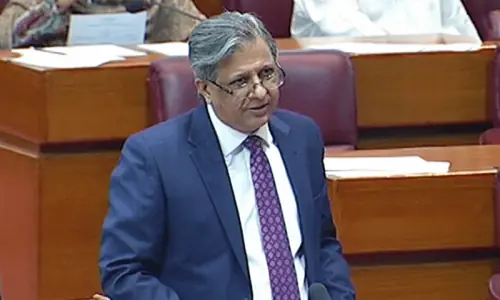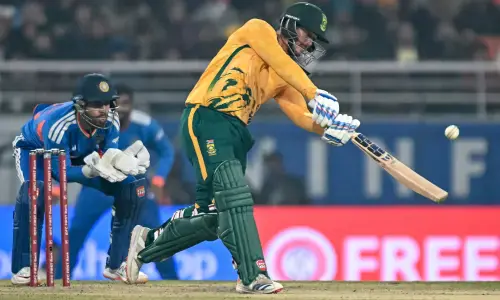It was physical – he beat me. It was psychological – he manipulated me. It was verbal – to this day, I flinch at Urdu slang, because I only learned it when it was hurled at me in the form of abuses. It was emotional – he took delight in humiliating and mocking me for his enjoyment.
He was skillful at lying and exploiting my feelings, and patient in gaining my trust and developing a relationship with me, before he began causing me harm. The abuse started slowly, building up over time.
He did things like grabbing my arm too hard, pinching me ‘as a joke.’ When I complained, he told me that I was being ‘delicate’ and making a ‘big deal’ out of ‘playful teasing’.
He would tell me how his friends and everyone in his university ‘knew’ about me and how ‘loose’ I was. This was the psychological aspect of abuse; belittling me, degrading me because he could. Because he knew he had the power to affect me with just his words, and saw fit to abuse it.
Over the passage of time, the abuse increased until it could no longer be disguised as playful teasing. It became blatant, undisguised abuse to punish me for perceived transgressions.
The first time he hurt me so severely that I wept was when I grabbed his phone and wouldn’t return it. I was retaliating for him doing the same earlier, teasing that I wouldn’t return it.
He grabbed and twisted my arm, but I still didn’t return it. He twisted it more, and I whimpered. “Cry all you want,” he told me, “I’m not letting go until you return my phone.” He slowly kept twisting my arm more and more, and that made me instinctively tighten my grip on his phone.
Finally, the pain was so severe that I couldn’t keep my fist closed. Now lifeless, my hand opened of its own volition and his phone fell on the floor. He immediately let go, and the second he did, I fell apart, crying hysterically for being treated this way.
It was all a ‘mistake’, he told me, as I wailed in his arms. He led me to the bathroom to wash my face. He hugged me after bringing me back outside, asking me to smile for him. “You only look nice when you smile”, he told me. It was all a mistake.
The next ‘mistake’ I made was to teasingly poke him with my foot. Not even my whole foot, just my big toe. He responded by kicking me, hard, in the thigh. The pain was excruciating and I couldn’t stop crying.
All those times when ‘mistakes’ were made – when he slapped me for swearing at him, when he slapped me for making a comment he disliked – it was all my fault, he said. I had given him chocolate or juice that made him hyper, and he needed to let the energy out somehow.
When he pushed me down that one time and whispered to me about how easily he could rape me, how I wanted him to rape me, it was my fault for taking a harmless ‘joke’ too seriously. Because, of course, threats, specifically rape threats, are something you make in jest.
He’d forcibly take my phone or Mp3 player from me and demand me to give him money if I wanted the devices back. I couldn't really wrestle it out of him because I was all of five feet to his 6'4. I had to give him money, which was upsetting. When I called him out once, he pushed me down and wouldn’t let me go until I did what he wanted me to do: to say that I was his whore.
When his friends would call and message me to slutshame me, I was just ‘lacking a sense of humour’ and was ‘taking their jokes too seriously’. I’d cry sometimes, asking him why he was letting his friends speak to me in such a way, or why he was speaking that way himself.
He’d tell me he left his phone in a friend’s car and the friend was just fooling around, or he’d say he was with his friends and thought it would be ‘fun’ to ‘tease me’.
He’d call me and tell me his friends wanted a night with me. Multiple times. The first time he did it, he told me, “Don’t worry, X isn’t going to go all the way with you, tumharay jism par tou mein ne kal raat apna naam pher diya.”
Related: A 7-step guide for Pakistani victims of hacking and blackmail
Sometimes, I tried to get away. I tried to ignore his calls and messages. He said he’d show the texts and calls between us to my family so they’d kick me out of the house. He said he knew where I lived, that he’d come himself and tell my father who he was. This was the threat I received every time I tried to get out of the relationship.
Another threat was, “YouTube kardun?” To this day, I don’t know what he was threatening to post on YouTube, but I’d still be scared, thinking he might have a text or some photo which I didn’t know he’d taken.
I wonder, as I write this, if he will recognise himself in this story. If he truly has something to YouTube and if he’ll do so to punish me for ‘giving him a bad name.’
Reader, you’re wondering, at this point, why I didn’t run. Why I didn’t look for help. There must have been something I could have done, you’re thinking.
For six years, I have thought about those 11 months. I know that I was overprotected like many women are. Yet, that protection left me ill-equipped to experience life, to understand how cruel men can be, how entitled they feel over my body.
I had spent my life being told to protect myself, my honour; failure to do so could only be my fault. Hashtag Internalised Misogyny. But that still isn’t an answer; my naiveté might be how I fell for his lies, but it isn’t an explanation for why I stayed.
I know that I was utterly terrified of him, and what he would do if I tried to leave. I was lonely and isolated with no support system except my university friends, who were as lost as I was.
They told me to stop talking to him, that he was a typical guy trying to take advantage of me. None of us ever called him abusive, they all told me he was a typical guy trying to get in my pants.
I believed that if I went to my family for help, they’d cast me out, disown me, and/or kick me out of the house. I thought they’d blame me and tell me I deserved it for doing something as wrong as being involved with a man.
And The Boy knew this very well; he knew I was afraid of my family, he knew I came from a conservative household and hid a lot of who I was from them, and he used it to his full advantage.
I was utterly terrified of my abuser but I was more scared of what he’d do if I tried to leave. I couldn’t see a way out. It was awful, living in such helpless fear, wondering when I’d be stuck with him the next time, when he’d use fear and threats to intimidate me into meeting him.
The only adult I could speak to was a much-loved Behavioural Psychology teacher, who figured out that something was wrong.
He approached me, asked me gentle questions now and then, and never abused his authority as a teacher or passed judgment.
It’s a debt I’ll never be able to repay, but even he couldn’t help me or get through to me.
Eventually, the bruises became prominent enough that my best friend brought up the matter with my siblings. I didn’t find out until years later that she had done this. Despite how distressing the resulting confrontation with my siblings was, I am thankful to her for having done so.
My siblings didn’t fully find out until years later what really happened to me, but when my best friend initially alerted them, they imposed a restriction on me from seeing my abuser.
And then … it became permanent. Time passed. Days turned into weeks, months, years.
I learned to name what had happened to me as abuse. I learned that I was a survivor. The hardest lesson was the realisation that I had mental health issues as a result, issues that will definitely last for the remainder of my life.
But I also learned how to deal with those issues, to be strong and learn to live life. I learned that when you’ve been abused, you’re never really the same, but that it is possible to rebuild, to have a rich, fulfilling life.
Guess what, though? I was abused again, years later, but there was a big difference. My first abuser had been a violent bully, someone I mistrusted and who terrified me; this abuser was a close friend, someone I trusted and felt safe with when it was hard for me to trust men anymore.
What’s worse is that as my feelings changed for him into love, he used the depth of my feelings to be more vicious, because he believed he could get away with it. To be honest, I sometimes feel that maybe he was punishing me for loving him because he didn’t believe he was worth it.
For years, I was constantly trying to be ‘better’ for this man. The few times he was good to me, were like scraps of meat thrown to a starving animal, only to later kick the poor beast. But because the animal remembers you’ve fed it a few times, it will whimper and stay, waiting for the food again.
It went on for at least four years until I saw what he was doing to me. When I finally saw the truth and confronted him, he admitted that he had been abusive, but had crueler things to say to me.
Read next: I was sucked into my husband’s narcissistic world, but came out of it stronger
When I finally saw him for a controlling egomaniac who got off on the power he had over me, I was emotionally and psychologically broken for a very long time.
It wasn’t until I left my familiar life to study abroad that I was able to face the victim I had been even as I learned to be a survivor, and reconcile the two as one person.
I learned then that being a survivor was not a shield against more abusers. I learned that I didn’t need to be ashamed of letting this happen and not knowing better, because I didn’t let anything happen.
What I need readers to understand is that abusers can be so manipulative that their victims start internalising the abuse. They blame themselves as the cause of abuse.
For the second time in five years, I rebuilt myself. I’m a survivor. I had to be strong and whole, in order to help other women who needed me. Who needed someone to look them in the eye and say, I’m a survivor too. Other people feel this way too. You’re never alone.
I wanted to write about abuse because I have personally lived that particular hell. I could have quoted statistics, research, various sociological or psychological theories. But I chose to connect with readers more personally, not just because my story, like every survivor’s story, deserves to be told.
In our society, we are so quick to blame the women, and then by default their whole family because a woman is burdened with the family’s 'respect' and 'honour.'
So perhaps there is a chance that someone reading this thinks my experiences of abuse simply happened because I come from a 'bad' household where I was not 'taught' the right way to be 'decent.'
But what about the man who beat the living daylights out of me on a daily basis? Did you, even once, think the same thing about him? Why not? Wasn’t he raised by a family, by parents too?
Where did he learn to slap a girl because she swore at him? If I ‘brought shame’ upon my family with my actions, does that boy exist as a separate entity, that he has no family, no parents, siblings to shame?
Before asking others why they raise daughters like me, why don’t you stop raising sons that beat women? Before shaming my parents for raising a warrior, why don’t you check in with your sons to see what kind of men they’re becoming?
I don’t ask for sympathy. I ask to be heard, because I want to tell my story and own it. I ask to be heard for all the women who do not have the opportunity or means to speak up.
I ask to be heard and understood, for this painful, gut-wrenching exercise to mean more than just a cathartic rant; if I could help just one person understand how abuse works, and how victims can be helped, then that’s one person who might be able to help someone in a similar situation as mine.
So if someone who is in an abusive situation reads this, know that you are worth more than being someone’s punching bag. Know that you do not have to pay the price for someone else’s need to hurt and dominate.
Know that there is a way out, and it might take years, and it might be a lifelong process, but it is so much better than living in fear and misery. You are not alone in fighting to believe that you deserve better.
If you're in an abusive relationship and want to seek help, the following are some of the organisations you can reach out to: The Punjab Commission on the Status of Women, Citizens-Police Liaison Committee, Social Welfare, Special Education And Women Empowerment Department, Aurat Foundation, Madadgaar, Bolo Bhi, and Digital Rights Foundation.
You can also share your story with us at blog@dawn.com






























